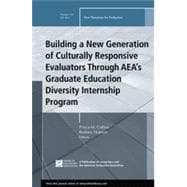- Factors that contributed to the design and organization of the program
- Critical components and aspects of the program that guide its implementation, characterized by the leadership training, mentorship and professional socialization, and the practical project placements
- Lessons learned, which reveal the opportunities and challenges of expanding pipelines and pathways of diversity and social justice through professional associations.
This is the 143rd issue in the New Directions for Evaluation series from Jossey-Bass. It is an official publication of the American Evaluation Association.








